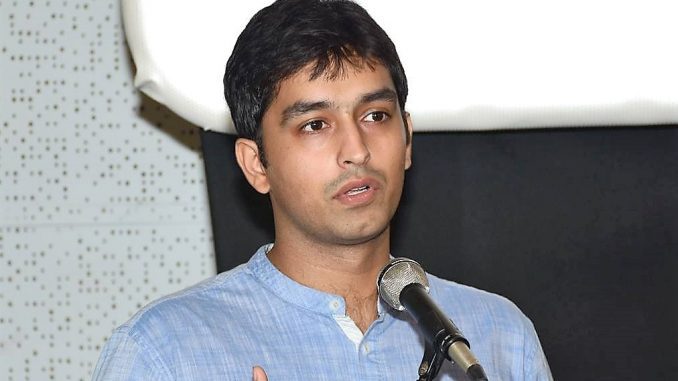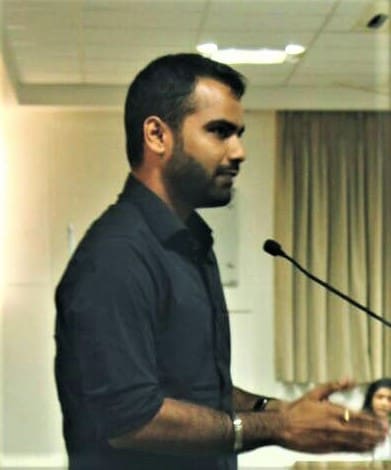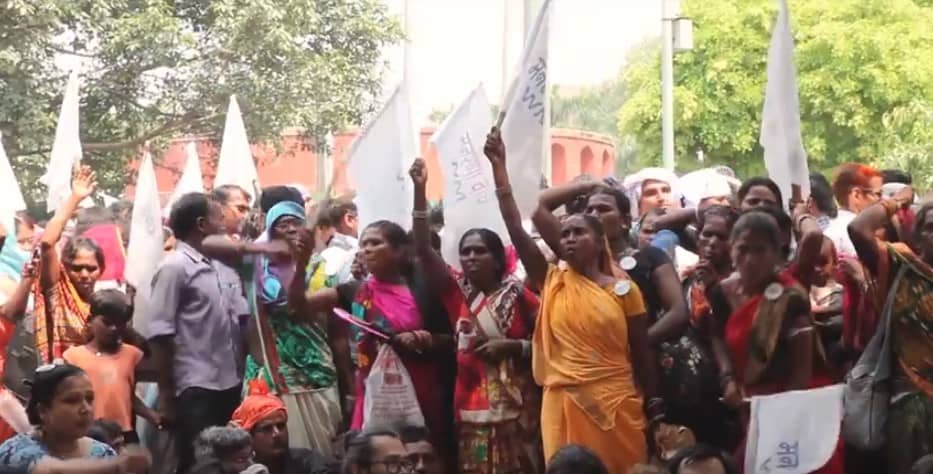Samarth Mahajan does not match the common man’s imagination of an IIT-ian. While exceptions may not be all that rare, India still associates IIT with successful corporate careers, fat salaries and most recently, Sundar Pichai! One doesn’t really think of a 24-year-old graduate from IIT Kharagpur giving up a coveted FMCG job on a whim, getting up on unreserved compartments on trains and taking a 17-day journey across the length and breadth of the country, capturing through his camera the voices and lives of a vast majority of people from its cities, towns and villages.
Samarth’s documentary The Unreserved, winner of the National Award (2018) for Best Audiography in a Non-Feature Film, is a stark, honest and unembellished reflection of the real India that is equally ignored by top-down policy makers, the urban elite and social media activists. It presents close glimpses of the goings on in various unreserved compartments of trains on the run from one part of the country to another, and candid conversations with those who travel in these compartments. These are the people, who travel regularly without reservation, herded like cattle and whose struggle, aspirations and dreams actually comprise the nation’s dominant social, economic and moral narrative.
Perhaps that is what piqued the interest of the urban affairs editor in me – for, whose city is it that we talk about, if not of the people that the documentary lends a voice to:
The father who has migrated to the city to pay for the treatment of a gravely ill daughter back home in the village…
Or, the domestic nanny, barely out of childhood herself, who is irritated by but cannot react to the tantrums of the pampered kid that she has to take care of…
Or, the woman who is actually taking a train out of the city to escape an abusive husband?
How do they connect with the larger issues of the urban spaces they inhabit and how does the film-maker who has spent so much time listening to their voices view that connection? How does the shrill urbanization dialogue in present-day India fit in with their realities?
Interestingly, shortly after shooting for The Unreserved, Samarth completed another directorial venture – We, The People, a documentary that chronicled the trials and tribulations of people who come from different parts of the country to protest at Jantar Mantar in Delhi. This again projected a different, but equally vivid, picture of the relation between the urban space and the masses who frequent such space or live in it.
Samarth is currently crowdfunding for his next project – The Borderlands, where he is traveling with his crew to towns and cities along all of India’s borders, exploring human stories which remain hidden behind the political and violent image of borders.
On one hand, therefore, his subjects present a section of people resigned largely to their lots, trying to make lemonade with the lemons that life has handed them; on the other, a group who believe in the power of protest, demanding their rights and reposing faith, despite all odds, in their ability to bring about a better future.
Ironically, both groups filmed by him belong to a similar class of society. What then differentiates the two? What makes one accept the ignominy of cattle class travel and the hardships of life in general with such equanimity, and what goads others to press for a better future?
“I think, it is determined to a large extent by the personal experience that these people have gone through. Even if you look at activists in history, it is often a personal experience that is the trigger for the making of a leader or a movement,” says Samarth, who believes that the transformation of Mohandas Karamchand Gandhi into Mahatma, the freedom fighter, was largely a consequence of the incident where he was thrown off a train in South Africa despite holding a first class ticket.
“I think the day one of these people travelling in a general compartment faces a particular incident that impacts her personally, she will perhaps end up in Jantar Mantar, protesting against the conditions in general class travel,” says Samarth though he does reiterate that not everyone can be an activist.
“Those in the margins want change too; it is not that they don’t want a better life or a better city where they work. They know the problems but they feel they do not have the power to make a difference,” says the young filmmaker who has spent days and months in trains and on the streets around Jantar Mantar, just listening to these people and their problems. “Every person cannot take ownership for change; as a woman, you may agree with a lot of issues raised by feminists, but you may not march in the sun for it,” he says discerningly.
The level of deprivation and the question mark over basic survival also disempower the poor and stop them from pressing for systemic improvements. “When you are travelling from a village in Bengal to a city in Kerala just to earn 400-450 rupees a day, the state of the unreserved compartment and its lack of hygiene or facilities don’t bother you. Nor do you look at the conditions of living in the city where you have landed. You are just waiting to reach your destination and start to earn because you need that money urgently for your family — to save for marriage or for your child’s education or health. Your personal problems are so great that you cannot think about the social. And these are 99% of the people in our country.”
What matters to the 99%
So what does it mean for the 99% when we talk of development or smart cities or even welfare schemes? Pretty much nothing.
“Smart cities are for the 1% of the population. Whether it is smart city or bullet trains, they will not solve problems for the 99%,” says Samarth.
I met Samarth with the producer of The Unreserved. Ashay Gangwar is contemplative, reticent and another atypical grad of IIT KGP, who quit the mainstream to start his own filmmaking venture, Camera and Shorts. For the most part of our meeting, Ashay remains quiet, attentive and acquiescent to what his friend and colleague says. But when we talk of development in cities, he opens up.
“An unfortunate problem in the country at this juncture is that the discourse is always around these few cities. Of how India’s future lies in the big cities. Yet, there is ample literature to show that migration is good only till a certain point. Migration creates a lot of frustration and depression among migrants, who anyway have so many problems to deal with. A person used to the open spaces of the village hates it when he has to settle in the black holes of the cities, which is where he finds space most of the time,” says Ashay.
“Talk of schemes and many a time they don’t even know what the schemes are or how they can avail those. Perhaps the media can play a better role in creating awareness among them,” he adds. “Otherwise, under circumstances where you don’t know where the next meal is coming from, you cannot spend time pressing for civic change or researching avenues of government assistance.”
Living in silos
Do our cities even universally acknowledge the problems and the conditions of the marginalised in them? No, and that is one of the biggest failings of urban society in Samarth’s eyes.
“The disconnect in big cities is a very critical issue,” says Samarth, “Take a big city like Bangalore. I have seen that it has a huge population of very well established people – many among them who have studied in the best institutions of the country like IIT, have lived and worked around the world, but often this means that they start thinking that they are the world. They are settled in their comfort zones, have weekend gatherings with 20 people of similar background, or they attend a movie screening with 400 people, and they really don’t have an awareness of other people with starkly different realities who may be living just a small distance away.”
To reiterate his point, Samarth remembers the time that they were shooting for We, The People in Delhi. It amazed him that many Delhiites actually did not know about Jantar Mantar being a hotbed of protest for dissenters and the dispossessed from all over the country.
“Even today, many do not know about the ban on protests there, or what transpired thereafter. After seeing The Unreserved, many people from the cities have told me, ‘We’ve been travelling in trains throughout our lives, but never knew so much was going on in the general compartments.’ But how can you not know? After all, these are the people who form the majority of passengers in the Indian Railways, they are so often people from your city or town,” he says.
From issues of the poor to realities of different communities — the ignorance of cities as well as their smugness is unmistakable. That is what bothers this filmmaker duo. “The only way to dispel this ignorance, this ‘gap’ is by reforming our education system,” says Samarth. According to him, education must open up more lines of direct communication, more familiarity with ‘the other’ and only then can we move towards a more inclusive society, urban and in general.
But how easy is that? And how willing are we to take a step in that direction? Only time will tell, but the winds definitely do not augur much hope.


